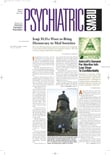Biographical Statement
I have been in public service throughout my adult life. As a former contracting officer and budget manager, I learned the skills of fiscal accountability, contract law, and professionalism in negotiation.
As a psychiatrist, I have served as a medical director of an inpatient unit and a chemical dependency rehabilitation unit. I have also directed mental health services for a community hospital. In those settings I learned team leadership and how to build consensus to ensure the delivery of optimal medical care within the constraints of limited resources.
I have been a residency program director and assistant chair of psychiatry for the past six years. We have a large program, multiple teaching hospitals, and more than 70 faculty members. From this experience I learned how to bring together a large faculty and hospital administrators to create an environment of academic excellence.
I supervise medical students and residents, maintain an active clinical practice, and provide consultation on addiction and forensic cases. I have provided consultation to multiple federal and international agencies (for example, the State Department, Peace Corps, and the governments of Croatia and South Africa) on the effects of trauma and terrorism; my research interests focus in this area.
I have been affiliated with the Assembly since 1993, when we began negotiation of the acceptance of an independent military branch. I have served as president, deputy representative, representative, and treasurer of the branch. I have been active in the Area 5 Council and the reference committees.
I have achieved success by attending to a few guiding principles. Specifically, I believe that the power of leaders comes from those who are being led, meaningful change occurs only when those affected have ownership of the process, and it is most prudent to examine carefully all aspects of a problem before attempting a correction.
Candidacy Statement
I was surprised and honored when notified that I had been nominated for the position of speaker-elect.
The Assembly is the representative component of APA and provides the bridge between APA members, the Board of Trustees, and the central office. The speaker-elect is responsible for duties assigned by the speaker, Assembly, and the procedural code and bylaws of APA and ultimately becomes the presiding officer of the Assembly. From this perspective, the primary goal of the speaker-elect is to ensure the smooth and efficient operation of the Assembly and effective communication of Assembly decisions to the Board of Trustees, central office, and other entities within APA.
The Assembly must optimally engage the membership, efficiently conduct its business, provide equitable discussion of differing views, and demonstrate accountability to the Association and its members. I have seen great advances in the structure and operation of the Assembly during the past decade.
Active engagement of the members-in-training, early career psychiatrists, minority and underrepresented groups, and allied associations is vital. MITs and ECPs are the lifeblood of the organization. The biggest impact on membership is recruitment of MITs and the retention of ECPs. As consumers, residents and ECPs compare the benefits of membership against dues expenses. It is imperative that they perceive that they are paying for benefits to themselves, their patients, and their profession and not the overhead expense of governance. Minority and underrepresented groups provide valuable input balance through participation in Area Councils and Assembly committees.
The Assembly can make better use of its time. Reference committees should review all action papers without the need for assignment to Area Councils. Reference committees have the proper diversity and are the correct size for thoughtful review of action papers. They include interested representatives from all geographic areas and other groups. Reference committees do not endorse papers when they are poorly worded and cost too much for the benefit gained or when the proposed action cannot be reasonably completed. The Assembly should rely more on the reference committees and cease the debate and last-minute word changes on the floor of the Assembly. We are too often forced to take action with limited deliberation during the final minutes of the meeting because of time spent in unproductive debate earlier in the meeting.
On controversial issues, we often have a voice vote, followed by a vote by standing, and sometimes followed by a vote by strength with paper ballots. These mechanisms are neither fair nor efficient. For a cost of approximately $20,000 a meeting, we can have an electronic, weighted voting system that will provide immediate results based on strength of membership and produce a permanent report of how each society and Area voted. This system would greatly reduce the time spent in voting and would provide direct accountability to the membership and the Board of Trustees. Perhaps such open reporting of votes might lead to other transparencies within the governance of the Association.
We have seen repeated efforts to restructure the Assembly. Attempts to force major change within organizations will not succeed unless those involved have a sense of ownership in the decision. I believe the role of deputy representatives in smaller district branches makes sense in providing a period of apprenticeship and continuity of representation. While we may need to make further reductions in attendance, we should ensure that such changes do not lead to disenfranchisement of some societies or Areas.
I have given you my thoughts on areas for future growth within the Assembly. Decisions for change lie with you. I look forward to serving you in whatever capacity you deem appropriate. ▪

